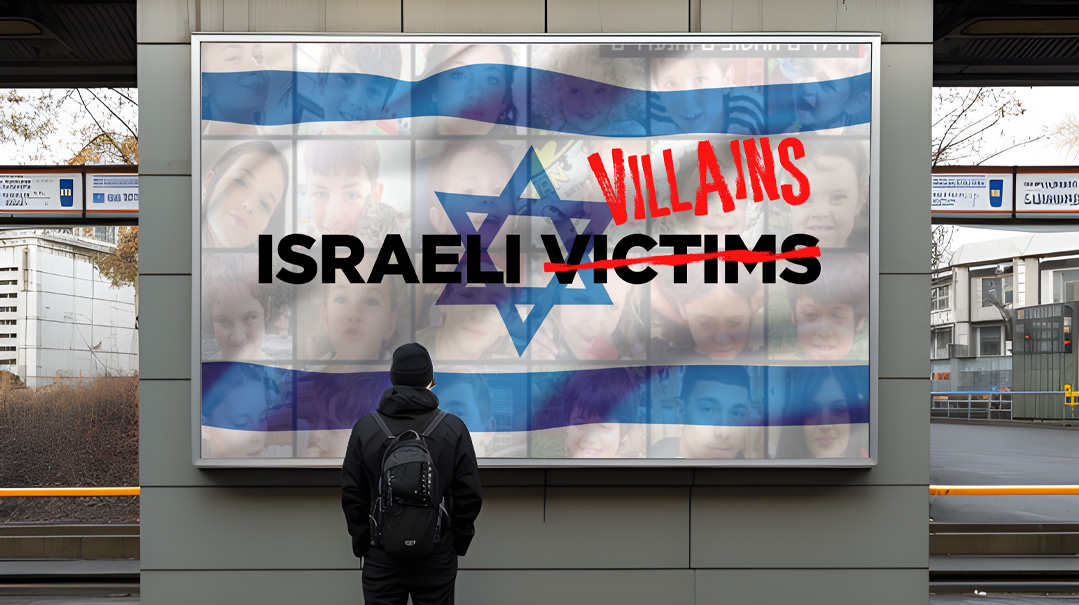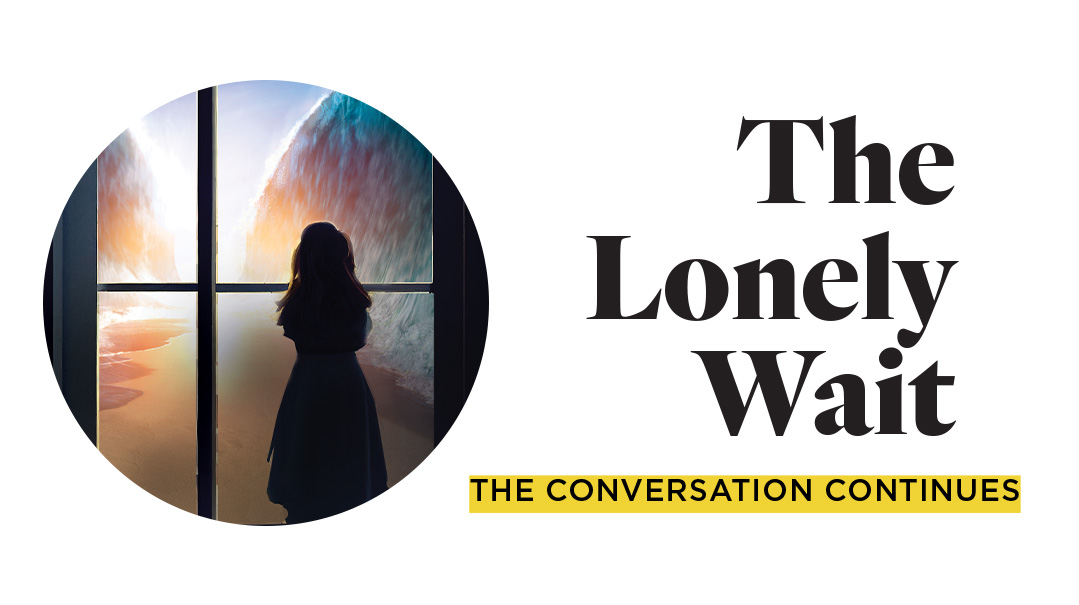Let Go of the Narrative
| November 14, 2023Acknowledging the limits of hasbarah, easing up on the desperation and our quest to convince the moral-equivalencers

After reading the recent well-reported feature on the media narrative about Israel, I think it’s important to ponder the underlying reason why so many of us are fully engaged in a desperate attempt to control the narrative. Why we’re trying to see, at the very least, some acknowledgment of certain basic realities on the ground by the media outlets of the world. After all, it’s not their brothers and sisters who suffered unspeakable horrors that refuse to fade from our memories.
I suspect we are craving some affirmation that their egregiously amoral “both-sides-ism,” moral equivalence, and moral relativism stem from foolish ignorance rather than from their deeply held anti-Semitic mindset or their liberal cognitive dissonance. We’re seeking emotional safety from the brutal reality. We want to know that we’re not alone; someone out there can be persuaded into helping us. We want to think that something about this is in our control.
The problem is — it’s not. And that’s the point.
We think that if we just tweak the formulation of our responses or show evidence for the truth one more time, maybe, just maybe, they’ll have a flash of moral clarity and understand that it’s all in the intentions, and that there can’t ever be equivocation between targeting civilians and targeting terrorists who hide behind civilians. Perhaps if we prove once again that the “Palestinian Health Ministry” invents casualty figures, then they’ll finally quit being Hamas’s useful idiots. Maybe if we show them that the Palestinians have a long history of hollering lies with respect to just about everything, they’ll issue a full-throated apology and reconsider their reporting around the invented Gaza hospital blast.
We think, maybe when they’re shown the ingenuity of the Pallywood productions team (a reference to the well-documented phenomenon of staged acts of suffering performed for cameras and reporters), they’ll stop giving these “shows” a platform to spark sympathy. Maybe instead of rushing their correspondents to cover the latest Pallywood episode featuring laughing “corpses” and blood-colored makeup, they’ll dispatch them to film the festivities in the streets after innocent Israelis are killed.
Maybe, if we just explain our positions more eloquently, they’ll stop engaging in the “narrative battle” (to quote CBS News). Maybe if we do a better job creating a victimhood complex around ourselves, they’ll focus on the actual victims in this story. Maybe if we show them ever-more gruesome footage, reality will sink in. Maybe they’ll report on how we’re still learning new information daily about the extent of the barbarism inflicted on our people while the authorities identify charred remains and return them to their families.
Maybe if we point out that Hamas has fired 8,500-plus rockets indiscriminately at Israeli civilians, they’ll talk to survivors of the ongoing daily attacks. Maybe if we persuasively illustrate how these barbarians are enemies of the West, they’ll have the self-awareness to reflect on how preposterous calls for a cease-fire would’ve been perceived following 9/11, and how unjust it would be to allow such violence to continue against the citizens of any country. Maybe instead of suggesting “an end to the violence,” they’ll report on how an army whose objective is to try and protect its people is progressing in this war against terror.
Maybe, we think, if enough of us send them footage of the violence and the jubilation over the spilling of Jewish blood at “pro-Palestine” rallies, along with information about the spike in anti-Semitic incidents around the world, they’ll actually report on them. Maybe if we send them enough footage of massive crowds from Sydney to New York chanting “gas the Jews” and “from the river to the sea, Palestine will be free” and “mobilize the intifada” and “there is only one solution,” they’ll report in horror about the West’s cultural complacency regarding calls for genocide against Jews. Maybe they’ll talk about what “free Palestine,” chanted by tens of millions around the globe, actually means. (After all, how many reports were we subjected to about a buffoon somewhere in a sea of people at a Trump rally supposedly flashing a white supremacy sign?)
Maybe they’ll have a serious discussion about where all this Jew hatred on campus is stemming from and the straight-up invented history and libels against Israel propagated in academia and among the student bodies. (Suddenly, there is no need to clamp down on fake news and to censor social media accounts spreading it.) Maybe if we send them the readouts, they’ll report on the hate-filled speeches. Maybe they’ll call out the government-funded university professors who praised the attacks and called them “exhilarating,” “awesome,” “incredible.”
Maybe, just maybe, when Hamas commits the worst atrocities sub-humanly imaginable, the world won’t minimize it, debate whether it was perhaps somewhat justified, debate the extent of the brutality and make us show them the photos of the mutilated limbs of our men, women, and children, of grandparents and grandchildren. Maybe, if we spell out the extent of the carnage just one more time, they won’t deny the extent of it and make us show their journalists gruesome video footage of the savagery. Maybe after all this, they’ll finally stand firmly along with those who stand for life and everything good.
Maybe if we show them evidence from poll after poll, video after video, and post after post on social media about the violent intentions of the vast majority of the Gazan people, they’ll stop claiming that “Hamas doesn’t represent the people of Gaza.” Maybe they’ll never again equate a people and an army, who want nothing more than to live in peace with their neighbors, with a people who want us to die.
Maybe if we just remind them one more time of the countless current and former Western military generals who have affirmed again and again over the years that no other army in history of warfare goes to the same lengths as the IDF to avoid “civilian” casualties, they’ll stop trying to hold us to an impossible standard that no other army in the history of warfare was ever held to or even considered as a remote possibility.
We need to finally learn from this and stop engaging with those who don’t want to know. To quit blaming ourselves for anti-Semitism. That doesn’t mean that we should abandon all kinds of hasbarah. We are responsible for hishtadlus. Polls suggest that, despite the poison on their screens, the majority of Americans’ sympathies are with Israel, and they understand that the Israelis are doing what they must. These people want to understand how to come to terms with headlines such as “Israeli Air Force Bombs Gaza Baptist Hospital, 500 Killed.”
But it does mean acknowledging the limits of hasbarah, easing up on the desperation and our quest to convince the moral-equivalencers. Why? Because we’re not in control, and it’s not our problem.
It’s theirs.
It isn’t our opinion that the overwhelming majority of Gazans support Hamas’s Jihadi policies, it’s in the polling numbers. It’s certainly not our problem if they insist on burying their heads in the sand and refuse to hear what the Gazans themselves keep yelling at us again and again about their grisly desires.
(And no, it still doesn’t mean that they all deserve to be killed, despite the fact that most of them want us dead. Why? Because we are not morally equivalent. I assume — and I certainly hope — that many of them wouldn’t personally murder us and are victims of their “education” system.)
We need to let go of our desire for control, to stop taking responsibility for their lunacy. Our chachamim through the ages have kept reminding us that anti-Semitism is meant to ignite the recognition within us that we ultimately have no one else to turn to besides Hashem.
(Originally featured in Mishpacha, Issue 986)
Oops! We could not locate your form.






